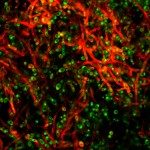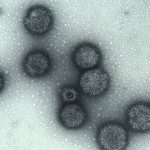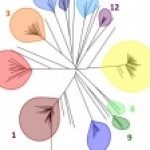Lien vers Pubmed [PMID] – 23904289
J. Infect. Dis. 2013 Nov;208(10):1705-16
In industrialized countries Candida albicans is considered the predominant commensal yeast of the human intestine, with approximately 40% prevalence in healthy adults. We discovered a highly original colonization pattern that challenges this current perception by studying in a 4- year interval a cohort of 151 Amerindians living in a remote community (French Guiana), and animals from their environment. The prevalence of C. albicans was persistently low (3% and 7% of yeast carriers). By contrast, Candida krusei and Saccharomyces cerevisiae were detected in over 30% of carriers. We showed that C. krusei and S. cerevisiae carriage was of food or environmental origin, whereas C. albicans carriage was associated with specific risk factors (being female and living in a crowded household). We also showed using whole-genome sequence comparison that C. albicans strains can persist in the intestinal tract of a healthy individual over a 4-year period.










